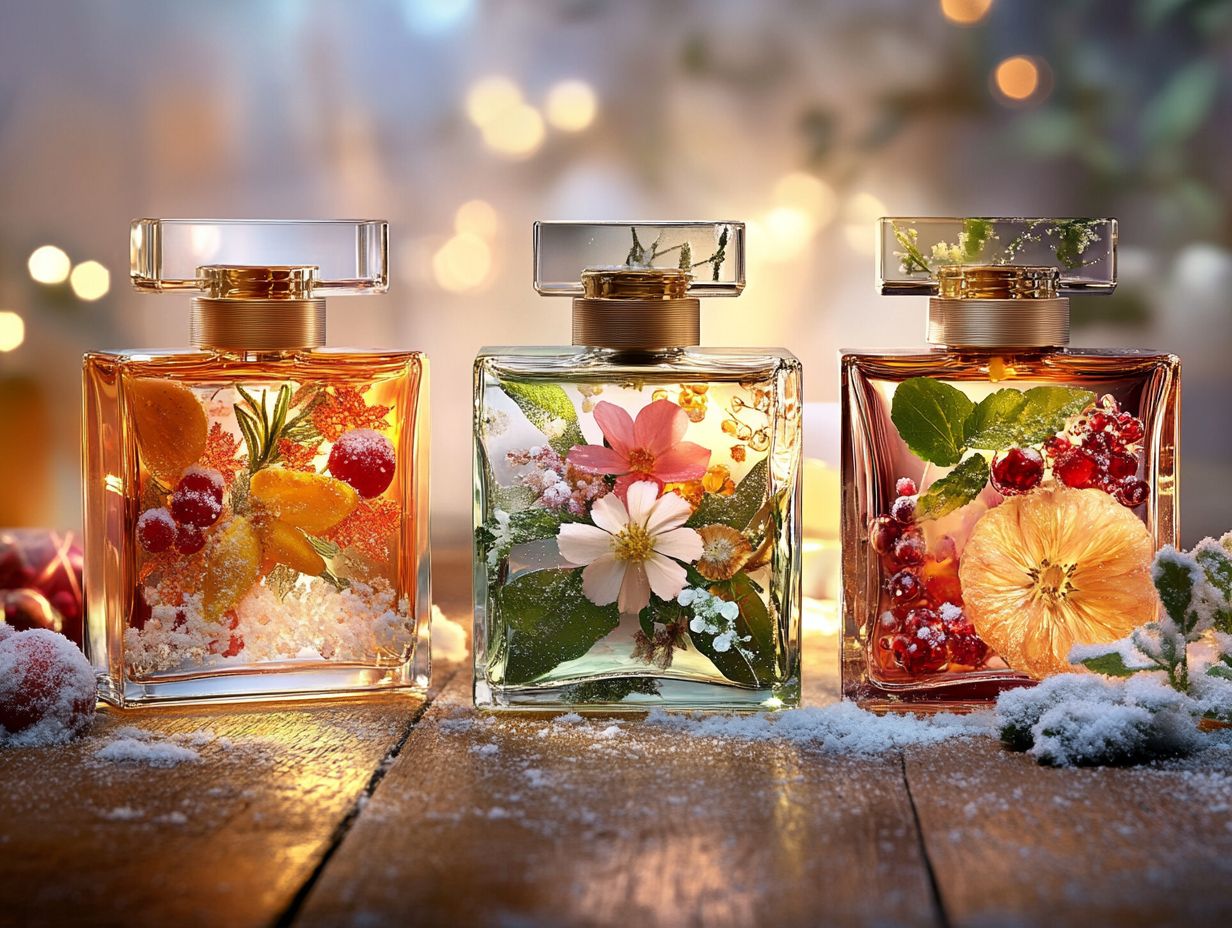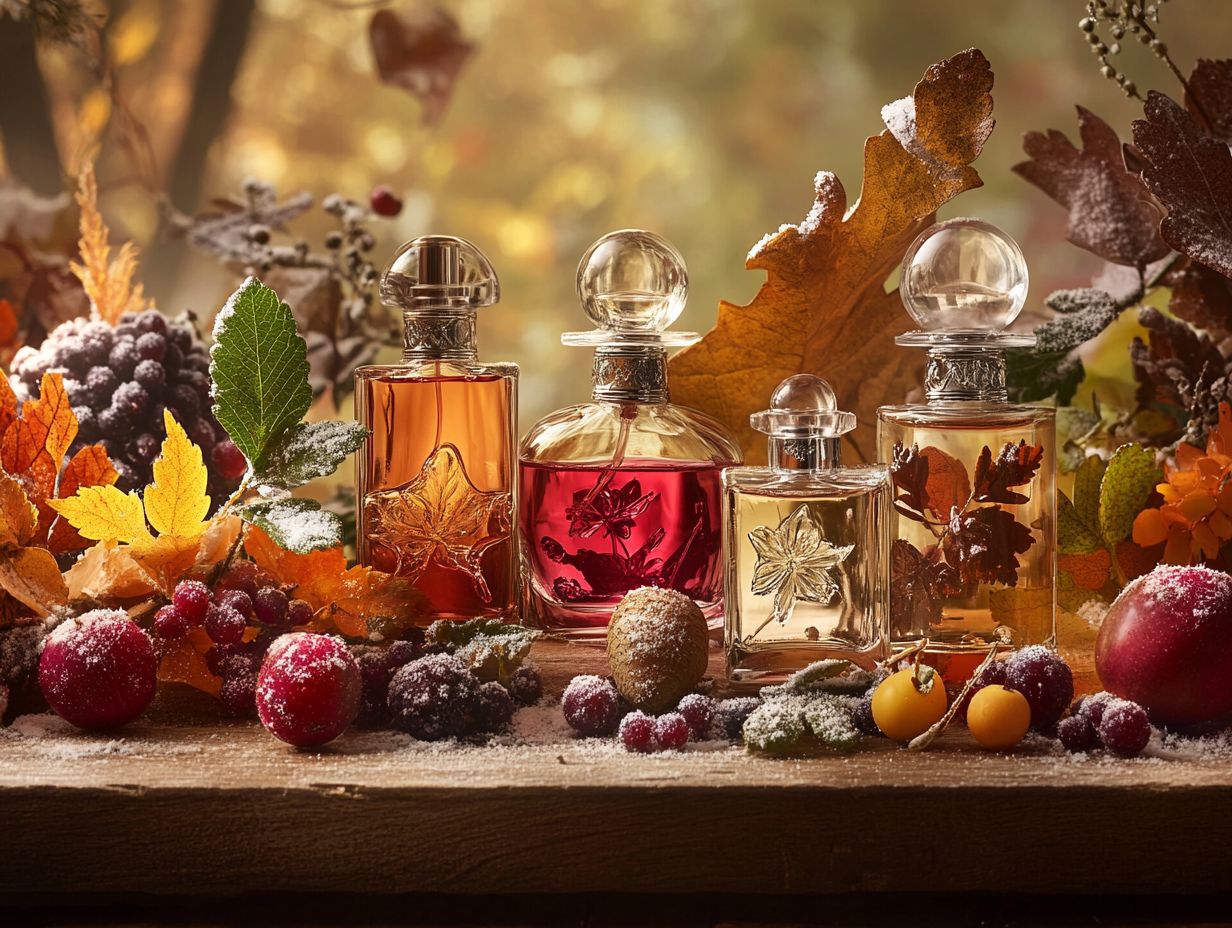Our sense of smell is intricately tied to our experiences and emotions, making it no surprise that fragrances often shift with the seasons.
Just as nature transforms from vibrant blooms in spring to the cozy warmth of winter, the scents we choose can reflect those changes.
Explore the best perfumes for each season, from floral and fresh notes in spring to woody and comforting aromas in winter.
We’ll also share tips on how to select the perfect scent to match the season.
Get ready to discover your next favorite fragrance!
Key Takeaways:

- Floral and fresh scents are perfect for spring, evoking feelings of renewal and growth.
- In the summer, opt for citrus and ocean-inspired perfumes to capture the essence of the season and provide a refreshing scent.
- During the fall, embrace the warmth and coziness of spicy fragrances, perfect for the changing weather and fall activities.
Why Perfumes Change with the Seasons
As the seasons transition from the warmth of summer to the chill of winter, the fragrances individuals choose to wear also evolve, influenced by factors such as temperature, mood, and personal preferences. Seasonal perfumes cater to our olfactory memory, evoking feelings and memories associated with specific times of the year, making it essential to adjust one’s scent wardrobe accordingly.
For instance, spring fragrances often feature floral notes and vibrant scents, while autumn fragrances tend to lean towards rich and spicy notes, highlighting the diverse and unique combinations that each season offers.
During summer, fresh and citrusy fragrances gain popularity, providing a refreshing escape from the heat, whereas winter invites deeper, warmer scents that envelop the wearer like a cozy blanket. Individual preferences significantly influence these choices, as some may gravitate towards nostalgic fragrances reminiscent of family gatherings or summer vacations, thereby enhancing their emotional connection to each scent.
The interplay between weather conditions and fragrance intensity also affects these decisions; lighter aromas may be perceived as more suitable during sunny days, while denser perfumes may be favored in the colder months. Ultimately, this seasonal rhythm of scent selection enriches the olfactory experience, allowing for personal expression.
Spring Scents
Spring fragrances are distinguished by their uplifting and invigorating notes, making them particularly well-suited for celebrating the renewal and freshness associated with the season.
These scents frequently incorporate floral undertones, fresh-cut grass, and bright citrus notes, evoking imagery of blooming flowers and sunny days.
Renowned brands such as Estée Lauder and Tom Ford exemplify this trend, employing harmonious combinations of jasmine, bergamot, and other floral elements to craft a vibrant scent profile that encapsulates the essence of spring.
Floral and Fresh Fragrances

Floral and fresh fragrances are highly regarded choices for the spring season, distinguished by their vibrant and sensuous appeal that encapsulates the essence of blooming flowers. Perfumes incorporating notes of jasmine, neroli, and bergamot offer an olfactory experience that is both uplifting and refreshing, rendering them particularly suitable for daily wear.
The practice of layering scents can further enhance the overall fragrance experience, enabling individuals to customize their perfume to align with personal preferences and varying circumstances.
These fragrances frequently include notes of rose, peony, and lilac, conjuring imagery of sun-drenched gardens. Esteemed selections such as Chanel No. 5 and Marc Jacobs Daisy exemplify this spirit, captivating all who encounter them.
To develop a signature scent, individuals may consider blending floral notes with fresh citrus undertones or a subtle hint of musk, resulting in a layered fragrance that feels distinctly personal.
Additionally, experimenting with different concentrations and applying them to various areas can contribute to a multidimensional experience, transforming every outing into an opportunity for self-expression through scent.
Summer Scents
Summer fragrances are typically characterized by their bright and invigorating qualities, reflecting the vitality of the season through notes that evoke the sun, sea, and vibrant landscapes.
Citrus notes, tropical aromas, and ocean-inspired scents are particularly favored during this time, as they offer a refreshing and uplifting olfactory experience that complements warm weather.
Perfumes from brands such as Lush and YSL Black Opium exemplify this essence, incorporating zesty elements that stimulate the senses and enhance the carefree spirit associated with summer.
Citrus and Ocean-Inspired Perfumes
Citrus and ocean-inspired perfumes are quintessential summer fragrances, renowned for their refreshing and invigorating qualities that align with the warmth and vibrancy of the season. These scents typically feature bright citrus notes combined with elements of fresh-cut grass and tropical aromas, making them well-suited for casual outings or beach days. Many of these fragrances are crafted as unisex options, appealing to a diverse range of personal preferences and styles.
The harmonious combination of zesty lemons, sweet oranges, and fragrant limes encapsulates the essence of sun-soaked days. Prominent brands such as Jo Malone and Giorgio Armani showcase fragrances like ‘Lime Basil & Mandarin’ and ‘Acqua di Gio,’ which expertly blend these citrus notes with marine accords and floral undertones to create a refreshing olfactory experience.
These perfumes transport wearers to serene coastal vistas, evoking a sense of relaxation amidst the gentle ocean breeze. Such unique formulations not only uplift moods but also rejuvenate the senses, making them ideal companions for warm-weather adventures or leisurely afternoons by the shore.
Fall Scents

Fall scents are characterized by their rich and complex profiles, often featuring spicy and warm fragrances that encapsulate the essence of autumnal landscapes and intimate gatherings.
As temperatures decline, fragrances that incorporate warm spices, earthy notes, and comforting aromas gain popularity, fostering an inviting atmosphere that aligns with the seasonal ambiance. Perfumes that include notes of clove, sandalwood, and amber evoke feelings of warmth and nostalgia, enhancing the experience of this time of year.
Spicy and Warm Fragrances
Spicy and warm fragrances are ideally suited for fall, offering a sense of comfort and warmth as temperatures begin to decline. Perfumes featuring notes of clove, sandalwood, and amber create a cozy scent profile that evokes nostalgic feelings associated with the autumn season. These fragrances tend to be rich and deep, allowing for unique combinations that cater to individual preferences and enhance the autumn experience.
Among notable examples, brands such as Jo Malone present the ‘Spice & Wood‘ scent, which skillfully combines aromatic spices with a woody undertone, evoking feelings of warmth and tranquility. Similarly, Tom Ford’s ‘Tobacco Vanille‘ artfully blends spicy tobacco with sweet vanilla, providing a sense of indulgence and comfort. The inclusion of patchouli and cinnamon in these compositions often evokes nostalgia, reminiscent of cozy evenings by the fireplace.
With their inviting characteristics, these fragrances have the potential to transform the autumn atmosphere, enveloping individuals in a warm olfactory embrace that feels both timeless and seasonal.
Winter Scents
Winter scents are distinguished by their profound and comforting profiles, featuring woody aromas and rich fragrances that provide warmth during the colder months.
The incorporation of amber, musk, and various aromatic notes contributes to an inviting atmosphere, ideal for cozy evenings indoors or festive gatherings.
Fragrances that utilize these elements can often be layered to create a more individualized scent experience that encapsulates the essence of winter.
Woody and Cozy Perfumes

Woody and cozy perfumes represent the quintessential fragrances of winter, providing an enveloping and warm aura that resonates with the season’s atmosphere. Notes of amber, musk, and various woody scents create a rich scent profile that is both comforting and grounded, often regarded as traditional choices for many individuals. These perfumes can be layered to add depth, allowing for a unique olfactory experience that reflects personal preferences.
Particularly, notes such as sandalwood and cedarwood evoke imagery of crackling fires and snow-covered landscapes, enhancing the cozy ambiance sought during the colder months. Notable fragrances such as Tom Ford’s ‘Santal Blush’ and Diptyque’s ‘Tam Dao’ exemplify these elements, effectively capturing the essence of winter in a bottle. The warm spiciness of nutmeg and clove contributes a festive touch, further solidifying these scents as seasonal favorites.
As temperatures decline, embracing these fragrances not only warms the senses but also enhances the overall winter experience.
Tips for Choosing the Perfect Seasonal Scent
Selecting an appropriate seasonal fragrance requires careful consideration of personal preferences, the range of available scents, and the distinct ways in which various fragrances resonate with individuals. It is important to take into account factors such as the occasion, mood, and even individual style, as these elements can significantly influence one’s fragrance choice.
Therefore, it is essential to cultivate a fragrance collection that reflects these considerations. Furthermore, exploring the technique of layering scents can result in unique combinations, thereby enriching the overall olfactory experience and ensuring that the fragrance remains in harmony with seasonal shifts.
Factors to Consider and How to Test Perfumes
When selecting the appropriate fragrance, several factors warrant consideration, including personal preferences, skin chemistry, and olfactory memory, all of which significantly influence how a scent is perceived.
The interaction between an individual’s skin and the notes in a perfume can vary based on factors such as skin type, pH levels, and dietary habits. Consequently, a fragrance that may be pleasing on one individual could be less appealing on another.
Olfactory memory, which encompasses the associations one makes with specific scents, can profoundly affect fragrance selection; familiar scents may evoke positive memories or emotions.
To accurately assess a fragrance, it is recommended to apply it to pulse points, such as the wrists or neck, allowing time for the scent to develop, as the initial top notes often differ from the deeper base notes.
Additionally, sampling fragrances at different times of the day can provide valuable insights into their longevity and the subtle nuances they reveal, thereby facilitating a well-informed decision when selecting the ideal scent.


